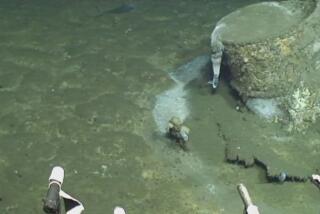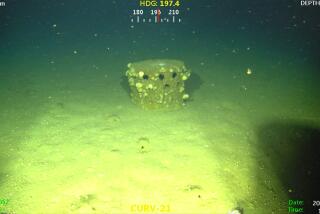Uranium Warheads May Leave Both Sides a Legacy of Death for Decades
Although the potential human cost of the war with Iraq is obvious, not many people are aware of a hidden risk that may haunt us for years.
Of the 504,047 eligible veterans of the 1991 Persian Gulf War, about 29% are now considered disabled by the Department of Veterans Affairs, the highest rate of disability for any modern war. And most are not disabled because of wounds.
For the record:
12:00 a.m. April 17, 2003 For The Record
Los Angeles Times Thursday April 17, 2003 Home Edition California Part B Page 15 Editorial Pages Desk 1 inches; 45 words Type of Material: Correction
Depleted uranium -- In Susanna Hecht’s March 30 commentary, a quote from the historian Tacitus -- “they made a desolation and called it peace” -- was said to refer to the Punic Wars. In fact, the quote refers to the Roman Empire’s actions against Britain.
These guys were rough, tough, buff 20-year-olds a decade ago. The vast majority are ill because of a complex of debilities known as the Gulf War syndrome.
These vets were exposed to toxic material from both sides, including numerous chemicals, fumes and weird experimental vaccines. But the largest number of the more than half a million troops eligible for VA benefits -- 436,000 -- lived for months in areas of the Middle Eastern desert that had been contaminated with depleted uranium.
Depleted uranium, or DU, is a highly toxic heavy metal that continues to emit low levels of alpha radiation. It is a byproduct of nuclear power plants and various military activities.
The United States has hundreds of thousands of tons of DU lying around, and for the Gulf War it developed a new use for the stuff: load it into warheads.
Though not technically “nuclear,” because the material is not really fissionable, uranium is a heavy metal ideal for lethally effective “warhead penetrators” that can pierce through armored tanks and fortified positions. When the munitions explode, the area is bathed in a fine dust of DU that can be easily inhaled. These aerosols also taint soil and water and pollute ground water.
If the penetrators do not explode, their casings gradually oxidize, releasing DU into the environment.
DU warheads are essentially dirty bombs -- not very radioactive, but poisonous, and this is why there is an increasing global outcry against using DU in combat as tips for armor-piercing rounds as well as in artillery shells and Tomahawk missiles, among others.
Such warheads were used very successfully by the U.S. in the Gulf War, when more than 350 tons of depleted uranium were dropped on Iraq, and later in Kosovo when about 13 tons of DU were exploded in the conflict there.
The “Balkan syndrome” that emerged among the military and civilians after the U.S. bombing there bears a similarity to the Gulf War syndrome.
Though the findings are controversial, many scientists now see these afflictions as the result of heavy metal poisoning and possibly exposure to very low levels radiation.
DU is implicated in respiratory and kidney problems, rashes and, longer-term, bone cancer, as well as damaged reproductive and neurological systems.
Iraqi civilians -- many more than the 100,000 who died in the conflict or as a result of the war -- also suffer from a range of similar health problems.
Families of soldiers should be very worried.
A huge amount of ordnance has already been unleashed in Iraq, and there is no way of knowing how many thousands of tons of depleted uranium will find “permanent storage” in the rubble of Iraq, its soil and the bodies of its people and U.S. occupying forces.
It is certain, however, that the legacy of contamination will add billions to the cost of reconstruction -- and our lack of generosity in Afghanistan is instructive about the sincerity of our pledges in this area. The stingy benefit package the Gulf vets got, even during boom times, is yet another cautionary tale.
The rosy fantasies of a democratized Arab world might make for good sound bites. But the reality of widespread DU use brings to mind the epitaph for the Punic Wars: “They made a desolation and called it Peace.”
More to Read
Sign up for Essential California
The most important California stories and recommendations in your inbox every morning.
You may occasionally receive promotional content from the Los Angeles Times.









